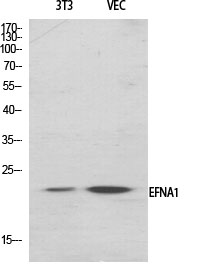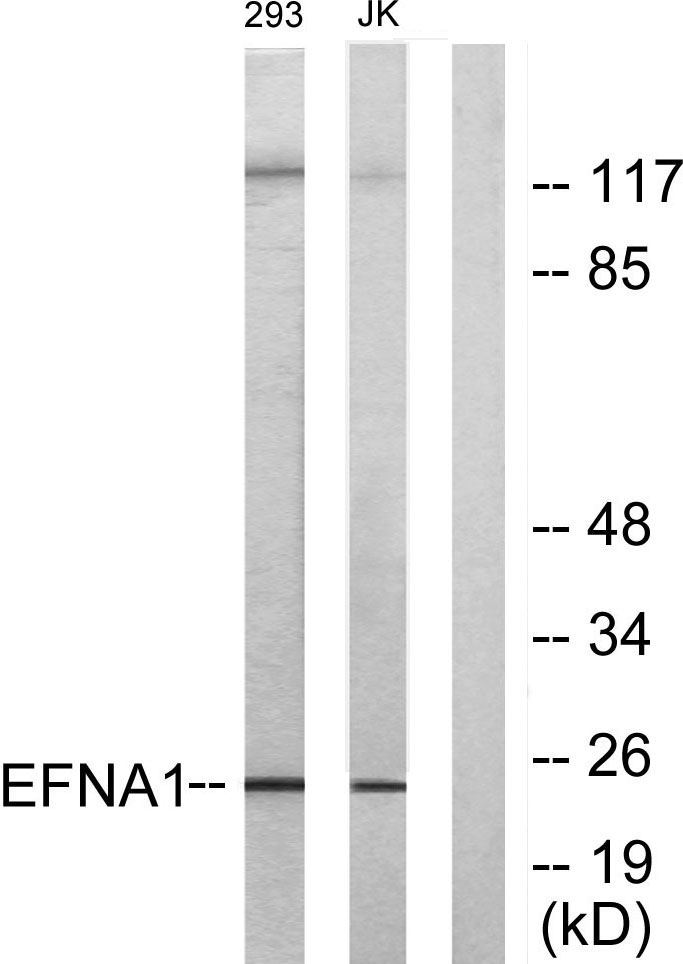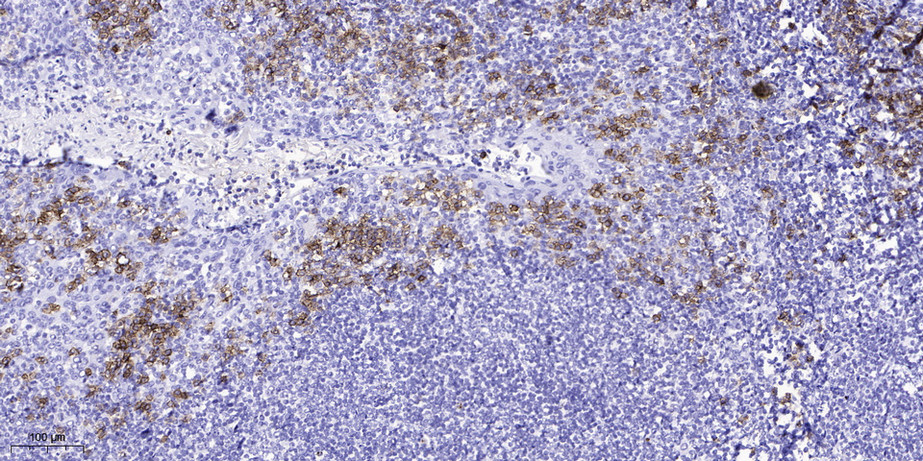Ephrin-A1 Polyclonal Antibody
- Catalog No.:YT1589
- Applications:WB;IHC;IF;ELISA
- Reactivity:Human;Mouse;Rat
- Target:
- Ephrin-A1
- Fields:
- >>MAPK signaling pathway;>>Ras signaling pathway;>>Rap1 signaling pathway;>>PI3K-Akt signaling pathway;>>Axon guidance;>>MicroRNAs in cancer
- Gene Name:
- EFNA1
- Protein Name:
- Ephrin-A1
- Human Gene Id:
- 1942
- Human Swiss Prot No:
- P20827
- Mouse Gene Id:
- 13636
- Mouse Swiss Prot No:
- P52793
- Rat Gene Id:
- 94268
- Rat Swiss Prot No:
- P97553
- Immunogen:
- The antiserum was produced against synthesized peptide derived from human EFNA1. AA range:66-115
- Specificity:
- Ephrin-A1 Polyclonal Antibody detects endogenous levels of Ephrin-A1 protein.
- Formulation:
- Liquid in PBS containing 50% glycerol, 0.5% BSA and 0.02% sodium azide.
- Source:
- Polyclonal, Rabbit,IgG
- Dilution:
- WB 1:500 - 1:2000. IHC 1:100 - 1:300. IF 1:200 - 1:1000. ELISA: 1:10000. Not yet tested in other applications.
- Purification:
- The antibody was affinity-purified from rabbit antiserum by affinity-chromatography using epitope-specific immunogen.
- Concentration:
- 1 mg/ml
- Storage Stability:
- -15°C to -25°C/1 year(Do not lower than -25°C)
- Other Name:
- EFNA1;EPLG1;LERK1;TNFAIP4;Ephrin-A1;EPH-related receptor tyrosine kinase ligand 1;LERK-1;Immediate early response protein B61;Tumor necrosis factor alpha-induced protein 4;TNF alpha-induced protein 4
- Observed Band(KD):
- 24kD
- Background:
- This gene encodes a member of the ephrin (EPH) family. The ephrins and EPH-related receptors comprise the largest subfamily of receptor protein-tyrosine kinases and have been implicated in mediating developmental events, especially in the nervous system and in erythropoiesis. Based on their structures and sequence relationships, ephrins are divided into the ephrin-A (EFNA) class, which are anchored to the membrane by a glycosylphosphatidylinositol linkage, and the ephrin-B (EFNB) class, which are transmembrane proteins. This gene encodes an EFNA class ephrin which binds to the EPHA2, EPHA4, EPHA5, EPHA6, and EPHA7 receptors. Two transcript variants that encode different isoforms were identified through sequence analysis. [provided by RefSeq, Jul 2008],
- Function:
- induction:By TNF-alpha and interleukin-1 beta.,similarity:Belongs to the ephrin family.,subunit:Binds to the receptor tyrosine kinases EPHA2, EPHA4, EPHA5, EPHA6 and EPHA7. Also binds with low affinity to EPHA1.,
- Subcellular Location:
- Cell membrane ; Lipid-anchor, GPI-anchor .; [Ephrin-A1, secreted form]: Secreted .
- Expression:
- Brain. Down-regulated in primary glioma tissues compared to the normal tissues. The soluble monomeric form is expressed in the glioblastoma multiforme (GBM) and breast cancer cells (at protein level).
- June 19-2018
- WESTERN IMMUNOBLOTTING PROTOCOL
- June 19-2018
- IMMUNOHISTOCHEMISTRY-PARAFFIN PROTOCOL
- June 19-2018
- IMMUNOFLUORESCENCE PROTOCOL
- September 08-2020
- FLOW-CYTOMEYRT-PROTOCOL
- May 20-2022
- Cell-Based ELISA│解您多样本WB检测之困扰
- July 13-2018
- CELL-BASED-ELISA-PROTOCOL-FOR-ACETYL-PROTEIN
- July 13-2018
- CELL-BASED-ELISA-PROTOCOL-FOR-PHOSPHO-PROTEIN
- July 13-2018
- Antibody-FAQs
- Products Images

- Western Blot analysis of various cells using Ephrin-A1 Polyclonal Antibody diluted at 1:2000
.jpg)
- Western Blot analysis of Jurkat cells using Ephrin-A1 Polyclonal Antibody diluted at 1:2000

- Immunofluorescence analysis of HeLa cells, using EFNA1 Antibody. The picture on the right is blocked with the synthesized peptide.

- Western blot analysis of lysates from 293 and Jurkat cells, using EFNA1 Antibody. The lane on the right is blocked with the synthesized peptide.

- Immunohistochemical analysis of paraffin-embedded human tonsil. 1, Antibody was diluted at 1:200(4° overnight). 2, Tris-EDTA,pH9.0 was used for antigen retrieval. 3,Secondary antibody was diluted at 1:200(room temperature, 45min).



